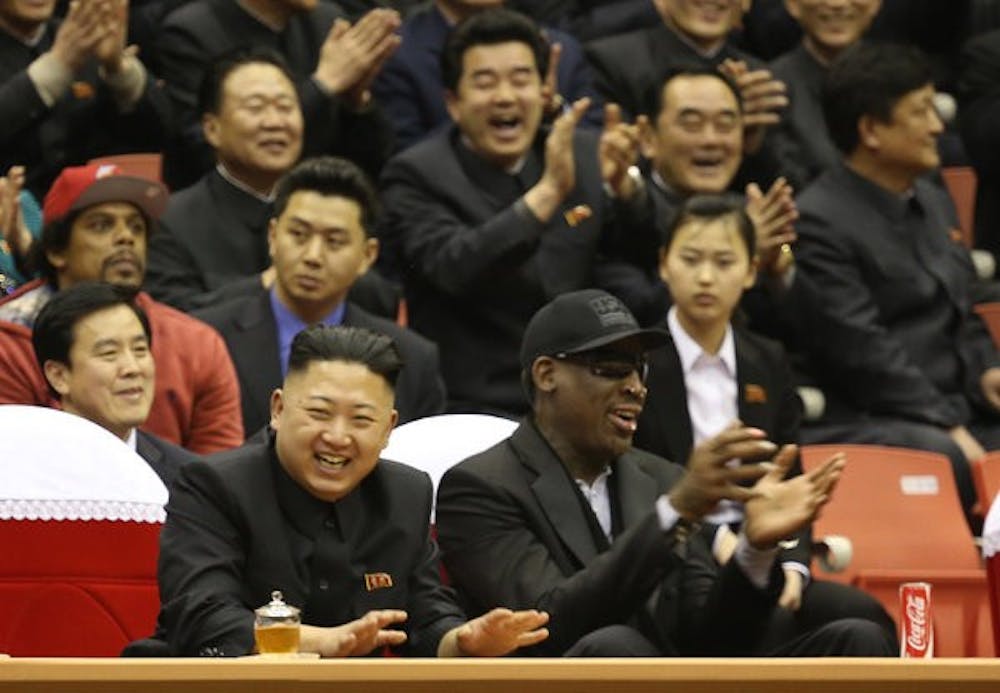The last person you might think of quelling the tense relations between the United States and North Korea is a character such as Dennis Rodman. Late last month Rodman visited North Korea in hopes of bringing peace to the country. “You have a friend for life,” he told Kim Jong Un, the North Korean dictator, while they watched a basketball game in the capitol city of Pyongyang. The White House later condemned Rodman’s trip. The man of many hair colors said he plans to return to the country. So why was Rodman’s trip so successful? How could Un and Rodman bond so quickly? The simple answer is sports.
 Kim Jong Il and Dennis Rodman met and became friends during Rodman’s recent trip to North Korea. Photo Courtesy The Associated Press website
Kim Jong Il and Dennis Rodman met and became friends during Rodman’s recent trip to North Korea. Photo Courtesy The Associated Press websiteSports has quite a history of bridging gaps between countries. “Ping-Pong Diplomacy” paved the way for president Richard Nixon to visit China in 1972. In 1971, the world table tennis championships were taking place in Japan. One afternoon American player Glenn Cowan was practicing and missed the team bus back to the hotel. Chinese player Zhuang Zedong spotted Cowan and invited him onto to the Chinese team bus. It was only a 15-minute ride back to the hotel, but when they were spotted together getting off the bus it caused quite a stir.
Mao Zedong then heard about the incident and invited the U.S. team to China to participate in a few matches. A little under a year later on February 21, 1972, president Nixon began his visit to China, ending 22 years of hostility between the two countries.
Perhaps the most well-known piece of sports diplomacy was the 1980 “Miracle on Ice.” The USA men’s ice hockey, made up of amateurs in the days before pro athletes were allowed to compete, shocked the world and beat the Soviet Union in the semi-final game of the Lake Placid Olympic games against all odds.
It was a big upset yes, but sports imitating life made for great theatre at the height of the Cold War when this game was played. This game doesn’t really fit the definition of diplomatic relations. However, it did show that if differences can be put aside for a hockey game, than why not politically?
Madeleine Albright also visited North Korea in 2000 and gave a basketball autographed by Michael Jordan to Kim Jong Il in an attempt to further diffuse relations between the U.S. and North Korea.
However Diplomacy and sports do not always work. The “Football War” took place in 1969 over the course of three soccer matches between what were already high tensions between El Salvador and Honduras. Each team won a game on their home turf amidst fights among fans in the stands. In the third and final match El Salvador won and on the same day the two countries severed all ties with each other, resulting in the war. It only lasted four days, but still had a lasting impact, since a peace treaty was not signed until 1980.
One of the more recent examples of United States State Department sanctioned diplomacy began in 2011 with soccer. Retired U.S. athletes go to other countries to teach children the game of soccer as well as life lessons. They create an exchange for children of other countries to come to the U.S. and engage in a discussion about sports and the issues in their countries.
Sports and diplomacy do tend to have a positive effect and I believe U.N. Secretary General Ban Ki Moon said it best: “Sports is a language every one speak, and its power as a tool in a country’s public diplomacy arsenal is being increasingly recognized. Mixing sport and diplomacy can help meet various foreign policy objectives: to bring about regime change, open the door for dialogue when it is closed to politics and to arouse a sense of national pride.”
If you have any suggestions as to what you would like to see me write about or cover this semester, have a comment about a recent post or simply want to talk sports, contact me at nkruege1@asu.edu or via Twitter @npkrueger




